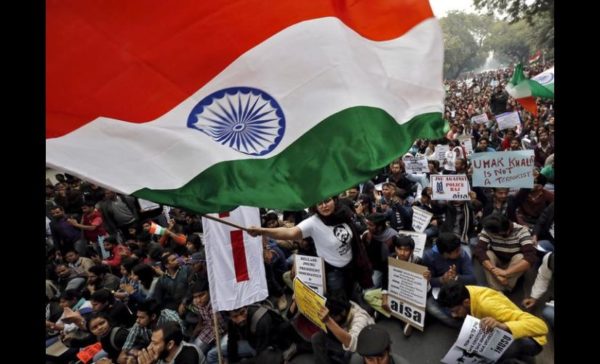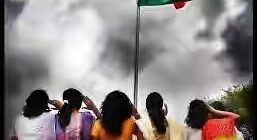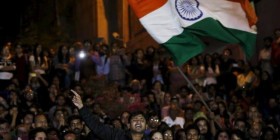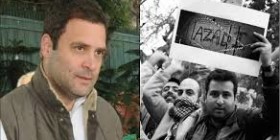We celebrated 15 August in the same way at my school, every year — an obligatory march past, the ceremonial flag hoisting followed by a cultural programme. It was not a holiday for us as attendance was compulsory. Every year, standing out on the school field, the same thought used to run through my head: Why do we pick this wailing banshee (a fellow student) to sing all the songs?
After making sure I collected the snack boxes, I used to head home only to sit in front of the telly to watch JP Dutta’s high on jingoism Border and later, when Lagaan released, the Aamir Khan-starrer proved to be a better entertainer. I moved on to Mani Ratnam’s Roja when I developed a teenage crush on Arvind Swamy.
The point is, Independence Day was spent hardly dwelling on the history of the country’s freedom struggle and the people’s movement it brought about. Blame it on the sense of entitlement that my generation is usually identified with.
This year, the Narendra Modi government has issued a diktat (let’s call it ‘instruction’) to schools across the country for the celebration of freedom fortnight, ‘Azadi 70 — Yaad Karo Kurbani’, from 9-23 August. The circular from the Ministry of Human Resource Development stated that activities should include mass singing of the national anthem, greeting card painting for the jawans posted on the border, slogan and essay writing and talks on on the ‘Freedom Struggle of 1857’. The irony of a government issuing orders to celebrate freedom can’t be missed.
A government circular to encourage students to remember India’s freedom struggle and leaders who made it possible and to instill feelings of patriotism and nationalism can’t be such a bad idea. Then again the self-styled nationalists of our country have gotten into the habit of categorising the citizens into ‘nationals’ and ‘anti-nationals’. Given the existing political climate, a person runs the risk of being labelled anti-national, if he/she chooses to not participate in these freedom fortnight celebrations.
The exponents of nationalism in India have a bizarre way of defining this feeling. It is perfectly logical for these nationalist vigilantes to play the national anthem before a movie to force feelings of patriotism even though all movie-goers care about is Great Grand Masti.
An Bollywood star can get away with making statements like, “When I used to walk out of that ring, it used to be actually like a raped woman walking out,” but an actor is forced to face sedition charges for making an honest confession that he is alarmed by the rising intolerance in the country, with his wife even suggesting leaving the country.
Last year, a man was lynched by a mob for allegedly possessing beef and a month ago, four Dalit youths were brutally assaulted by self-styled gau rakshaks. The entire horrifying episode was recorded and shared. With a state in turmoil and vote bank at stake, Prime Minister Narendra Modi finally spoke against the cow vigilantes during his town hall address on 6 August, “It makes me angry that people are running shops in the name of cow protection. Most of them are anti-social elements hiding behind the mask of cow protection.” But he didn’t assure any harsh punishment or stringent law to curb the power of the cow vigilantes; “state governments to prepare a dossier on such people” was his only assurance.
In a country where violence is unapologetically meted out over an animal, terms like ‘ghar wapsi’ become political agenda, students are termed anti-nationals for not saying ‘Bharat Mata ki Jai,’ a mother-daughter pair is gang raped, but the so called torch-bearers of law and order choose to engage in political rhetoric, the government’s diktat to celebrate Independence Day with freedom fortnight and tiranga yatra simply comes across as coercion and an attempt to perpetuate the divisive politics that has become more pronounced lately. Will a tiranga yatra manage to restore faith of the many Kashmiri youths, who feel so alienated by the government, that they choose to make a martyr of a Mujahideen commander? If students are getting a list of dos and don’ts for 15 August, they will probably soon be marked ‘anti-national’ instead of ‘failed’ in their report cards.
Eminent professors and authors including Noam Chomsky, Orhan Pamuk, Akeel Bilgrami had issued a very strong statement when protests erupted in Jawaharlal Nehru University after the arrest of JNUSU president Kanhaiya Kumar for allegedly raising anti-India slogans during a student rally. It stated:
We can only conclude that this arrest is further evidence of the present government’s deeply authoritarian nature, intolerant of any dissent, setting aside India’s longstanding commitment to toleration and plurality of opinion, replicating the dark times of an oppressive colonial period and briefly of the Emergency in the mid-1970s.
The cheerleaders of nationalism in India seemed to have confused the term with freedom of expression. Any form of dissent against authority or a voice that is not in line with the political ideology is being equated with being anti-national. This is, however, not a new trend as it saw manifestations under different regimes in India.
Noted historian Romila Thapar explained nationalism as:
Nationalism has a lot to do with understanding your society and finding your identity as member if that society. History is essential to a national ideology, but it has to be a shared history. It cannot be a history based on one identity, but has to be all inclusive.
She went on to say that “today efforts are being made to obfuscate the existing definition of nationalism. The nationalism draws on reliable history and not just on anyone’s fantasy about the past.”
In a country, where instances of racism, sexism, homophobia and violence against minority communities are unabashedly flaunted, the call for a fortnight of Independence celebration sounds hollow and oddly has a Trumpuesque “let’s make our country great again” ring to it.






Leave a reply